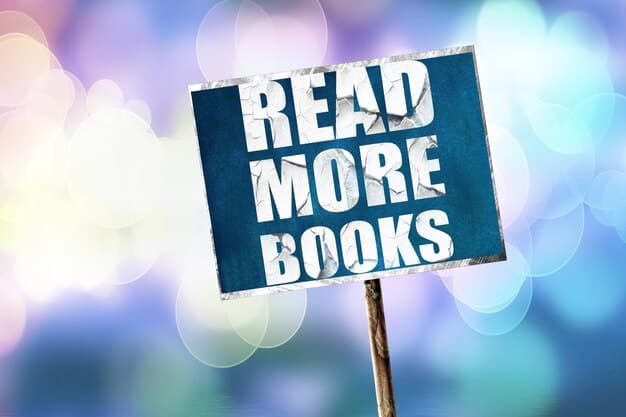Selecting Book Club Picks: Spark Debate, Not Arguments 2025

Selecting book club picks in 2025 demands a nuanced approach that encourages vibrant discussion and intellectual exploration rather than heated disagreements, focusing on diverse, culturally relevant, and thought-provoking titles that resonate with group interests while fostering respectful analytical engagement.
Navigating the literary landscape for your book club can feel like a delicate dance, especially when aiming for discussions that are both lively and harmonious. The challenge lies in choosing books that ignite thoughtful conversation without sparking unnecessary contention. This guide, “The Ultimate Guide to Selecting Book Club Picks That Spark Debate (and Not Arguments) in 2025,” offers insights and strategies to curate a reading list that truly resonates, engages, and elevates your book club experience.
Understanding the Dynamics of Book Club Discussions
Book clubs thrive on engaging discussions, but the line between a spirited debate and a heated argument can sometimes be fine. The key to fostering productive conversations lies in understanding the inherent dynamics of group literary analysis. It’s not just about the book itself, but how the group interacts with it and with each other. A great book for a book club isn’t always one that everyone loves, but rather one that offers multiple entry points for interpretation and discussion, allowing for a spectrum of viewpoints to emerge.
When members feel heard and respected, even dissenting opinions can enrich the collective understanding of a text. This requires intentional selection of books and thoughtful facilitation of discussions. The goal is to move beyond mere plot summaries and into deeper thematic explorations, character analyses, and reflections on the author’s craft. This depth is what transforms a casual gathering into a truly enriching intellectual exchange.
The Nuance of Debate Versus Argument
It’s crucial to distinguish between a debate and an argument. A debate, in the context of a book club, involves a constructive exchange of differing opinions, backed by textual evidence and personal interpretations. The aim is to persuade, clarify, and deepen understanding, not to win. Participants listen actively, present their viewpoints respectfully, and are open to having their perspectives broadened or even shifted.
Conversely, an argument often devolves into a confrontational exchange where participants prioritize winning over understanding. This usually involves personal attacks, defensiveness, and a lack of willingness to engage with opposing viewpoints constructively. Recognizing these differences is the first step in ensuring your book club meetings remain positive and intellectually stimulating.
- Debates focus on ideas, not individuals.
- Arguments often target personal beliefs or characteristics.
- Effective debates foster learning and growth.
- Arguments can damage group cohesion and discourage participation.
Facilitating this distinction often comes down to the book choice. Books that deal with complex themes, unreliable narrators, or open-ended resolutions naturally lend themselves to debate, as there’s no single “correct” interpretation. This ambiguity encourages members to articulate their perspectives and engage with the nuances of the text, rather than simply stating a fixed opinion.
Establishing Ground Rules and Expectations for 2025
A successful book club doesn’t just happen; it’s cultivated. Before delving into specific book selections, it’s paramount to establish clear ground rules and expectations. This pre-emptive measure can significantly mitigate potential conflicts and ensure that every member feels comfortable sharing their thoughts. These guidelines serve as a mutual agreement, a social contract that governs how discussions proceed, ensuring respect and inclusivity remain at the forefront. They should be collaboratively decided upon and regularly reviewed.
For 2025, consider updating or formalizing your club’s charter to reflect contemporary sensibilities around diverse viewpoints and sensitive topics. This might involve discussing how the group will handle disagreement, what constitutes respectful dialogue, and what boundaries are in place for discussing potentially polarizing themes. Transparency and shared ownership of these rules will foster a stronger, more resilient book club environment.
Crafting a Book Club Charter
A formal book club charter doesn’t need to be rigid or overly bureaucratic. It can be a simple, agreed-upon list of principles that guide your interactions. Key components often include guidelines on speaking turns, active listening, and the commitment to understanding differing perspectives. For instance, you might agree that “we discuss the book’s ideas, not the person holding them.”
- Active Listening: Encourage members to truly hear and understand points being made, rather than just waiting for their turn to speak.
- Respectful Disagreement: Teach members to articulate their dissent without resorting to accusatory language or personal attacks. Phrases like “I see your point, but I interpreted this differently because…” can be helpful.
- No Interruptions: Establish a norm where one person speaks at a time, ensuring everyone has the opportunity to express themselves fully.
- Confidentiality (Optional): If personal anecdotes arising from the discussion are shared, agree on a policy of keeping those within the group.
Beyond these foundational rules, consider adding guidelines for challenging dominant narratives or viewpoints presented in a book. This encourages critical engagement with the text while ensuring that any potentially offensive or problematic elements are discussed thoughtfully, rather than being dismissed or amplified without proper context. Regularly checking in with the group on these rules helps reinforce their importance and allows for adjustments as the club evolves.

Diverse Voices and Global Perspectives
In 2025, the literary world continues to embrace a wider array of voices and narratives, moving beyond traditional Western-centric perspectives. Selecting books that offer diverse voices and global perspectives is not merely about ticking a box; it enriches discussions by introducing members to new worldviews, challenging preconceived notions, and fostering empathy. These books often explore themes of identity, social justice, historical trauma, and cultural nuances that Western literature might not fully address.
By stepping outside one’s comfort zone, readers can gain a deeper understanding of the human experience in its myriad forms. This deliberate diversification of your reading list significantly increases the likelihood of sparking meaningful debate, as members grapple with unfamiliar contexts, differing moral frameworks, and complex socio-political landscapes. It encourages questions like “How would I react in this situation?” or “What does this story reveal about universal human struggles?”
Expanding Horizons with International Authors
Introducing international authors or books translated from other languages can be a powerful way to broaden your book club’s scope. These works often carry cultural specificities that provide rich fodder for discussion, allowing members to explore themes through a different lens. Consider authors from Latin America, Africa, Asia, or the Middle East, each offering unique narrative styles and perspectives.
- Explore works by Nobel Laureates from non-Western countries.
- Look for contemporary fiction gaining international acclaim.
- Consider non-fiction that delves into specific cultural histories or social issues.
- Utilize online resources like the Booker Prize longlist or Goodreads lists for international reads.
When selecting such books, it’s beneficial to seek out those that have garnered critical recognition both in their home countries and internationally. This often indicates a work with significant literary merit and complex themes suitable for deep discussion. Additionally, providing some preliminary context about the author’s background or the book’s cultural setting can help members better appreciate the narrative, setting the stage for more informed and nuanced debate.
The aim is to move beyond surface-level appreciation and encourage members to engage with the text in a way that respects its cultural origins while also relating it to their own experiences. This balance is crucial for fostering debate that is both insightful and respectful of diverse perspectives, avoiding ethnocentric interpretations.
Leveraging Current Events and Social Relevance
The most compelling book club discussions often emerge from texts that resonate with current events or address socially relevant issues. In 2025, our world continues to grapple with climate change, technological advancements, shifting social norms, and global inequalities. Books that touch upon these themes can serve as powerful catalysts for debate, connecting the fictional world with real-world concerns. This approach transforms reading from a solitary activity into a communal exploration of contemporary challenges.
Choosing books that are timely allows members to bring their own experiences, perspectives, and background knowledge of current affairs to the discussion. This immediacy often leads to more passionate and personal engagement, as the themes of the book directly reflect issues they encounter in their daily lives or in the news. The goal is to select books that invite reflection on the present and potential futures, rather than simply analyzing historical or purely fictional scenarios detached from contemporary relevance.
Books That Mirror Our World
Consider books that explore emerging technologies, ethical dilemmas posed by AI, political shifts, environmental concerns, or evolving social justice movements. These topics are inherently debatable and can spark robust conversations about our collective future. Non-fiction works, memoirs, or literary fiction that tackles these themes can be particularly effective.
- Select books that explore the societal impacts of AI and automation.
- Choose narratives focusing on climate emergency and human adaptation.
- Read memoirs or journalistic accounts that shed light on contemporary social justice issues.
- Explore historical fiction that draws parallels to modern political or social climates.
A practical tip is to scan reputable news sources, literary journals, and “best of” lists from the past year for books that have generated significant public discussion. These are often indicators that a book has the capacity to provoke debate within your club. However, be mindful of selecting books that are excessively polarizing if your group struggles with maintaining respectful dialogue. The aim is to spark constructive debate, not to ignite personal arguments based on divisive political viewpoints.
Remember, the power of a book club lies in its ability to facilitate empathy and understanding, even when discussing difficult topics. By choosing books relevant to our world today, you provide a platform for members to engage with complex realities, fostering both intellectual growth and social awareness.

Strategies for Facilitating Discussions That Spark Debate
Once you’ve selected a thought-provoking book, the next crucial step is to facilitate the discussion in a way that encourages genuine debate rather than mere opinion-sharing. Effective facilitation transforms a group of readers into a vibrant intellectual community. It involves more than just asking open-ended questions; it demands active listening, strategic prompting, and a keen sense of group dynamics. The facilitator acts as a guide, ensuring all voices are heard and that the conversation remains on track, exploring complexities rather than superficialities.
In 2025, facilitation might also involve leveraging technology to enhance discussions, whether through shared digital notes, pre-discussion polls, or even incorporating multimedia elements related to the book’s themes. The goal is always to cultivate an environment where members feel empowered to critically engage with the text and each other’s interpretations, fostering a truly memorable and impactful literary experience.
Key Facilitation Techniques
A designated facilitator can employ several techniques to steer discussions towards productive debate. This includes preparing a list of open-ended questions, encouraging members to support their interpretations with textual evidence, and skillfully redirecting conversations if they become overly personal or stray off-topic.
- Open-ended Questions: Ask questions that don’t have simple “yes” or “no” answers. For example, “What moral dilemmas did this character face, and how would you have handled them?”
- Textual Evidence: Encourage members to cite specific passages or plot points to support their arguments. This grounds the debate in the text itself.
- “Parking Lot” for Tangents: If the discussion veers off course, gently suggest “parking” that topic to return to it later, ensuring the main discussion stays focused.
- Devil’s Advocate: Sometimes, the facilitator can play devil’s advocate to provoke deeper thought and challenge assumptions, always doing so respectfully.
Another powerful strategy is to introduce an external resource, such as a critical review, an author interview, or a relevant academic article, prior to the discussion. This can provide new lenses through which to view the text and generate additional points of debate. However, ensure these resources don’t overshadow the group’s own interpretations but rather serve as a springboard for further exploration. The ultimate aim is to cultivate a space where members feel safe and encouraged to explore the grey areas, to question, and to grow through the shared experience of reading and debating.
Avoiding Arguments: Strategies for Maintaining Harmony
While sparking debate is desirable, ensuring these debates don’t devolve into arguments is paramount for the long-term health and enjoyment of any book club. Arguments often stem from a lack of respect for differing opinions, a misunderstanding of the other person’s viewpoint, or a tendency to take criticism of an idea personally. Mitigating these risks requires proactive strategies and a commitment from all members to foster a supportive and inclusive environment.
The goal is not to eliminate disagreement, as healthy debate is a hallmark of intellectual engagement, but rather to manage it effectively. This involves both preventative measures in book selection and responsive techniques during the discussion itself. A thriving book club is one where members feel safe to express even unpopular opinions, knowing they will be heard and respected, even if not agreed with. This balance ensures that literary exploration remains the primary focus.
De-escalation and Conflict Resolution
Even with the best intentions, conflicts can arise. The facilitator, or even group members, can employ simple de-escalation techniques. One effective method is to reframe a contentious statement into a question, inviting clarification rather than opposition. For example, if someone says, “That character was clearly evil,” a facilitator might respond, “What actions led you to that conclusion? Do you think the author intended any ambiguity?”
Another technique is to encourage “I” statements, shifting focus from “You are wrong” to “I interpreted this differently because…” This personalizes the opinion without attacking the other person’s intelligence or judgment. When discussions become too heated, it can be beneficial to take a short break, allowing emotions to cool down before resuming the conversation. Sometimes, simply acknowledging the tension (“It seems we have strong feelings on this point”) can help defuse the situation.
- Use “I statements” to express personal interpretations.
- Reframe opinions as questions to encourage further explanation.
- Take short breaks if emotions run high.
- Remind the group of the agreed-upon ground rules for respectful dialogue.
Ultimately, a book club’s success in avoiding arguments while still fostering robust debate hinges on a collective commitment to empathy and mutual respect. This means understanding that different readers bring different life experiences and perspectives to a text, and these differences are precisely what make a book club so valuable. By approaching literary interpretation with curiosity rather than certainty, members can navigate disagreements constructively, turning potential arguments into opportunities for deeper understanding.
Crafting the 2025 Book Club Reading List
The culmination of understanding book club dynamics, establishing ground rules, embracing diversity, and preparing for facilitation is the creation of your 2025 reading list. This list should be a thoughtful curation, balancing literary merit with potential for engaging discussion. It’s an iterative process, often involving suggestions from members, exploration of literary trends, and considering the overall goals and interests of your specific club. A balanced list offers variety—genres, time periods, and complexities—to keep things fresh and appealing to a wide range of tastes.
Remember that a successful reading list is not static; it should evolve with your club. Regular feedback sessions can ensure that the selected books continue to meet the group’s expectations for both intellectual stimulation and enjoyment. Aim for a mix of well-known titles and hidden gems, classic works and contemporary releases, to ensure a rich and varied reading experience throughout the year.
Tips for a Balanced Selection
When curating your 2025 list, aim for a spectrum of literary experiences. Don’t be afraid to include books that challenge the group, but also incorporate lighter reads occasionally to prevent burnout. Consider the length and complexity of books; mixing a sprawling epic with a concise novella can keep the pace varied. Think about thematic arcs over the year—perhaps a quarter focused on historical fiction, followed by a season of speculative fiction.
- Mix Genres: Include literary fiction, non-fiction, historical, sci-fi, and even poetry or short stories.
- Vary Length and Difficulty: Alternate between shorter, more accessible reads and longer, more challenging ones.
- Rotate Conveners: Allow different members to propose and even lead discussions for chosen books.
- Survey Member Interests: Periodically poll your members on genres or themes they’re interested in exploring.
Explore “Book Club Kits” offered by publishers or libraries, as these often come with discussion questions and supplementary materials. Look at award nominee lists (like the Pulitzer, Booker, National Book Award) for books that have already proven their capacity to spark critical discussion. Most importantly, ensure the selection process is democratic, allowing all members to feel invested in the reading choices. This collective ownership of the reading list is a powerful motivator for participation and a guarantee that your book club will continue to thrive and foster rich, respectful debates for years to come.
| Key Strategy | Brief Description |
|---|---|
| 📚 Diverse Voices | Select books by authors from varied backgrounds to broaden perspectives and discussions. |
| 🌐 Global Themes | Choose books exploring international issues or different cultural contexts for rich debate. |
| 🗣️ Ground Rules | Establish clear guidelines for respectful disagreement and active listening within the group. |
| 💡 Facilitation Tips | Prepare open-ended questions and encourage textual evidence to guide discussions constructively. |
Frequently Asked Questions
Focus on books with complex themes, ambiguous endings, or strong character motivations that allow for multiple interpretations. Avoid overly didactic or preachy texts. Encourage respectful critical analysis over personal endorsement or rejection of a book’s viewpoint. Diverse authors often provide new perspectives that inherently prompt discussion. Establish clear group guidelines before sensitive topics arise.
Literary fiction that delves into ethical dilemmas, historical narratives with modern relevance, non-fiction exploring societal issues, and speculative fiction that imagines future societal impacts are excellent choices. Works with unreliable narrators, multiple perspectives, or those translated from different languages also tend to generate rich debate and deeper understanding within the group.
The facilitator should remind members of agreed-upon ground rules, reframe contentious statements as questions, and encourage the use of “I” statements. Promoting active listening and asking members to support their views with specific textual evidence can help keep discussions objective. A short break can also serve to de-escalate tension and allow emotions to cool down.
Including controversial books can be highly enriching, but only if the club has established strong ground rules for respectful an open discussion. Assess your group’s maturity and comfort level with sensitive topics. These books often lead to the most profound debates, but require careful facilitation to ensure they foster understanding rather than division among members.
Diversity—in authors, settings, and themes—is crucial for stimulating engaging debates. It introduces new perspectives, challenges assumptions, and broadens understanding of the human experience. Diverse books encourage critical thinking about different cultural contexts and societal norms, moving beyond familiar narratives and providing a richer foundation for thoughtful and respectful discussions.
Conclusion
The art of selecting book club picks that spark debate, rather than arguments, is a nuanced but highly rewarding endeavor. It involves a thoughtful blend of literary discernment, an understanding of group dynamics, and a commitment to fostering an environment of respectful intellectual exchange. By embracing diverse voices, leveraging current events, and employing effective facilitation strategies, your book club can transcend casual reading to become a vibrant forum for deep engagement and personal growth. The books you choose in 2025 will not just be stories; they will be catalysts for connection, critical thinking, and a shared journey of discovery.





